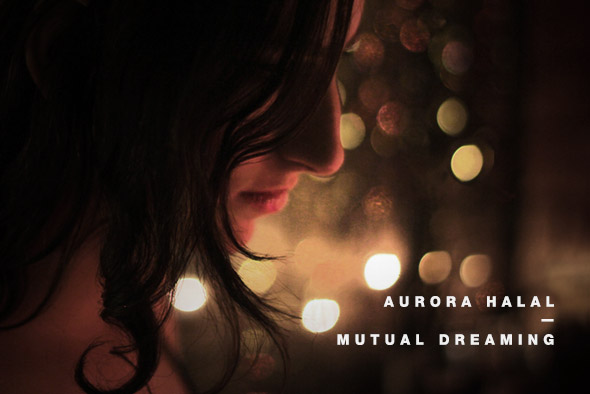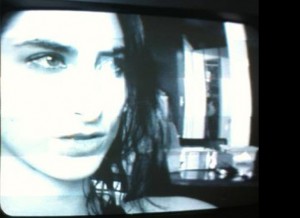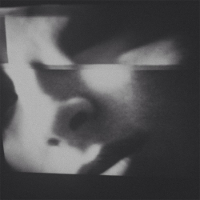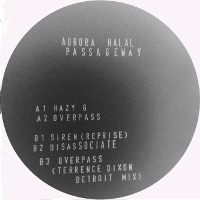Aurora Halal: Mutual Dreaming

Scott Wilson talks to Brooklyn-based Aurora Halal about promoting parties in New York and how her personal response to the club space has shaped her new musical direction.
“A lot of my friends have the same schedule or lifestyle where you just hustle. It can definitely be stressful, but I love it.” I’m talking to Aurora Halal about how she perceives the supposed difficulty of making it in New York. When I meet her at her apartment off Myrtle Avenue on a freezing December afternoon, she’s just woken up after being up until 5am taking membership card photos for local venue Bossa Nova Civic Club. Not that you’d think it, darting as she does from topic to topic in an energetic manner that can only be described as stream of consciousness.
If you’ve watched last year’s Resident Advisor’s Real Scenes documentary on New York City, you’d be forgiven for thinking that from parts of it at least, making it in the city’s underground music world is an endless struggle of titanic proportions. This notion is something reflected in numerous sitcoms, dramas and movies about twenty-somethings set in the city, most of which seem to suggest that New York is a place where people come to succeed or die trying, with little fun to be had along the way. The hustle is one of the most enduring myths of New York life, and although Halal has certainly done her fair share of hustling to get to where she is as a party promoter, video artist, video editor and musician, and endured a fair number of last minute venue setbacks along the way, there’s little sense that she’s ever seen it as a struggle. “I would use the opposite of the description of New York as ‘it’s so hard.’ What it is, is just specific. You have to be very creative, and once you submit to that paradigm, then it’s just a playground.” Given Halal’s sheer energy and obvious creative drive, it’s little wonder she enjoys the city so much.

Halal has been putting this concept into practice with the Mutual Dreaming parties she has organised and run since late 2010, transforming various loft and warehouse spaces across Brooklyn into temporary autonomous zones for the night, fitting into a longstanding tradition of New Yorkers pushing the boundaries of what to expect from a club space. For Halal, starting these parties was about simply wanting to experience things on her own terms, citing a lack of parties she identified with at the time. “The only reason I started it is because I wanted to go to a great party that was going to be experimental and have dance music,” Halal explains, “there’s a lot of places in New York where it’s not about the music at all, so it’s really important to create a safe space. It just seems like there’s an endless crowd of people in New York that are drunk and annoying that just want to party. That’s not what this is about.”
For Halal, the number of people in attendance is secondary to the atmosphere itself. The past three years of Mutual Dreaming events have seen many underground US talents play memorable sets: Beautiful Swimmers, Traxx, Galcher Lustwerk, Terekke, Andrés, and Veronica Vasicka are just a few of the names that have played at her parties. It’s not just the guests that make the vibe of Mutual Dreaming though, but the effort that Halal goes to in order to make the space feel unique that marks her parties out as something special. “It always changes from night to night – some of the installations are really elaborate, and some are simply making it dark with a few flashing lights, adding fog and bringing in massive sound.” Some of the more unconventional ideas have involved hanging a military parachute from the ceiling to enclose the space, and the inclusion of a three dimensional installation by visual artist Florence To involving projection mapped floating screens.
 That the Mutual Dreaming parties are such a sensory experience is unsurprising considering Halal’s prior background in visual work, which has seen her create music videos for Beautiful Swimmers and Protect-U among others, manipulating various types of analogue film and video to engagingly psychedelic effect. Although Halal has had a longstanding love of video art since her college days, which manifests itself in her parties, videos and ongoing A/V collaborations with Ital, the next stage of her career will see her expand Mutual Dreaming to include its own label, which she will be using to release her first record, the five-track Passageway EP. For Halal, who has spent years being self-sufficient, having full control over how her music was released and presented was paramount. “I think it’s just important to put things out and do it your way, because it’s the final step of the artistic process,” she explains. “It’s really important to take a step in the open.”
That the Mutual Dreaming parties are such a sensory experience is unsurprising considering Halal’s prior background in visual work, which has seen her create music videos for Beautiful Swimmers and Protect-U among others, manipulating various types of analogue film and video to engagingly psychedelic effect. Although Halal has had a longstanding love of video art since her college days, which manifests itself in her parties, videos and ongoing A/V collaborations with Ital, the next stage of her career will see her expand Mutual Dreaming to include its own label, which she will be using to release her first record, the five-track Passageway EP. For Halal, who has spent years being self-sufficient, having full control over how her music was released and presented was paramount. “I think it’s just important to put things out and do it your way, because it’s the final step of the artistic process,” she explains. “It’s really important to take a step in the open.”
New York certainly isn’t short of record labels, and it would be tempting to lump Halal among the numerous figures in the city currently making messy, lo-fi, hardware-based house and techno, but Halal’s music occupies a slightly different space. Citing James Stinson’s project The Other People Place and the music of Function and Terrence Dixon as examples of artists she particularly admires – producers with a deep, clean sound which utilise a rich range of frequencies to great effect – its unsurprising that her solo work evokes a more explicitly sensual quality than her previous work with Steve Summers as Innergaze. While that project looked more to classic minimal wave and disco for inspiration, the Passageway EP is a more club-focused, and club-inspired collection of tracks, exploring a more vivid and psychedelic direction than the competitively lo-fi sound of Innergaze.

As you’d expect from someone who has run their own party for several years, the idea of the club space and how different music can affect it is obviously something that impacts her deeply – something that stems from six months spent in Berlin during her degree several years ago. “The modern club experiences in Berlin have influenced me more than anything,” she explains. “Even though I don’t think the music is exactly what I want to be hearing – it’s a little too minimal for me in the way it’s presented, but the way that it’s super deep and churning, and psychologically overwhelming is really impactful for me. I like the idea that you can like just get lost in music for days. It’s almost like a drug.” This is something reflected in Passageway track “Disassociate”, whose robust rhythms are accompanied by a swirling analogue melody and vaporous textures with sinister undertones. As well as being more musically tuned for soundsystems than her previous work, Passageway also explores the idea of the club in a more conceptual manner.
“The record is like a journey through subterranean experiences on a night out,” she muses. “I feel that in going to parties you safely play with these elemental forces of darkness and positivity – it’s a stage for your psychology to play out.” This psychology is explored in full on Passageway. “Siren” – a churning piece of deep, acidic techno which pulses with a kind of strange plasmoid energy – was inspired by a trip to Berlin’s Berghain, where the overwhelming darkness of the space was reflected in the sunken faces of those who had partied a little too hard for too long. Despite being on the verge of leaving, she found herself called back to the club after hearing a familiar song, “I imagined addicts pulled back in a way that’s positive but also destructive… It’s like this weird, almost existential tunnel,” she explains, “it’s strange to see this dark side of partying. It’s this celebration of life, but there’s also a demented cousin to it. The joyous song that brings you back could also be like a Siren song.”

Both “Hazy G” and “Overpass” reflect these darker notes, with the former’s bass snarl sounding like a drugged up Drexciya track, and the latter’s dubbier textures being complemented by a sinister melody whose cloudy, indistinct nature evokes the distinct feeling of being watched. It’s something reflected in the sleeve art, a black and white portrait of Halal taken through a surveillance camera. Halal’s prior video work has always had a faintly voyeuristic quality to it, but in this context, with its abstract, almost Man Ray-like cover, sensuality and danger are combined in just way her music seems to suggest. Enigmatic Detroit-based producer Terrence Dixon – whose music is imbued with similarly paranoid moods – makes for an intriguing but logical choice of remixer on Passageway transforming “Overpass” into a prickly piece of techno that sounds like someone being stalked up the stairs to the upper level of the subway.
Despite the obvious statement being made in calling her label Mutual Dreaming, which has come to be known as a party featuring international guests, and the inclusion of Terrence Dixon on the debut release, Halal downplays the idea of expanding the label beyond her own music – but doesn’t rule it out. “I will cross that bridge when I get to it. I’m not launching a label as this big statement; it’s mostly just that I want to release my music properly. But I can definitely think of some people I’d want to put music out by.” As well as a follow up record which she is currently working on, she will be releasing a collaborative EP with Ital on his imprint Lovers Rock, and has a track featured on a forthcoming compilation released by Brooklyn’s Bossa Nova Civic Club.
“From a very small scene you can have a lot of exciting ideas germinating, and it’s really beautiful to see it develop,” she explains to me as our conversation comes to an end, as I ask how the city is faring for club culture given the increased gentrification and police crackdown on warehouse parties. “I feel like you have to be optimistic – that’s why I was cracking up when the Real Scenes documentary came out that was edited to be all about how hard New York is, and how it’s about the struggle, yet they don’t include any gays, females, and hardly any people of color in their summary of the scene.” She explains, “I thought it was funny because real New York is so vibrant, and there are so many different perspectives. It feels free because you can try things and there’s an audience for it – it’s amazing to see how impressionistic and open-minded the audience can be.” Impressionistic the audience may be, but without people like Aurora Halal to challenge their conceptions, New York’s nightlife would probably be much less interesting.
Interview by Scott Wilson
Header image by Ilaria Pace